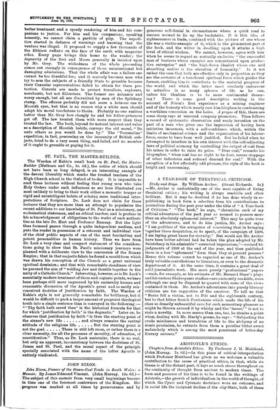ST. PAUL, THE MASTER-BUILDER
The Warden of Keble's small book on St. Paul, the Master- Builder. (Methuen and Co., 38. 6d.), the notice of which should not have been so long delayed, is an interesting example of the devout liberality which marks the trusted teachers of the High Church school in the Oxford of to-day. It is impossible to read these lectures without feeling that young men who take Holy Orders under such influences as are here illustrated are most unlikely to bring to their work either a monastic temper or rigid and unintelligent habits of echoing mere traditional inter- pretations of Scripture. Dr. Lock does not claim for these lectures that they are more than an attempt to popularise the recent additions to our knowledge of St. Paul as a missionary, an ecclesiastical statesman, and an ethical teacher, and is profuse in his acknowledgment of obligations to the works of such authori- ties as the late Dr. Hort and Professor Ramsay. But the light thus focussed passes through a quite independent medium, and puts the reader in possession of a coherent and individual view of the chief public aspects of one of the most fascinating and potent personalities in human history. Thus we have from Dr. Lock a very clear and compact statement of the considera- tions going to show that St. Paul's missionary journeys were planned with a deliberate view to the conversion of the Roman Empire; that in that majestic fabric he found a mould from which was drawn his conception of .the Church as a great universal spiritual dominion ; and that with remarkable steadiness of view he pursued the aim of "welding Jew and Gentile together in the unity of a Catholic Church." Interesting, however, as is Dr. Lock's essentially modern treatment of these and cognate points, we have been perhaps still more impressed by his eminently human and reasonable discussion of the Apostle's great and so easily mis- conceived doctrine of justification by faith. The Warden of Keble's style is not generally remarkable for brilliancy, but it would be difficult to pack a larger amount of pregnant theological truth into a single sentence than is conveyed in the following :— " Thy faith bath saved thee' is the historical formula for that for which justification by faith' is the dogmatic." Later on, he observes that justification by faith "is thus the starting point of
the sinner's new life and always remains the central attitude of the religious life But the starting point is not the goal There is still left room, or rather there is a clear necessity, for all the processes of morality, of education, of sanctification." Thus, as Dr. Lock maintains, there is no real, but only an apparent, inconsistency between the doctrines of St. James and St. Paul, and the moral aspect of the principle specially associated with the name of the latter Apostle is entirely vindicated.


















































 Previous page
Previous page